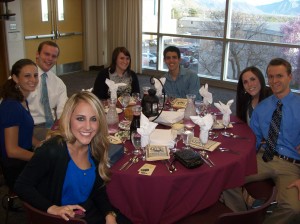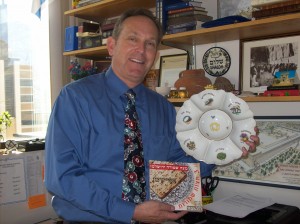Since the 1970s BYU has hosted the Passover Seder Services, which started out with only a handful of students and has grown to include over 900 guests.
The BYU Passover Seder Services are held every spring, and this year’s services will be on March 8, 15, 22 and April 12 in the Wilkinson Student Center. Tickets go on sale Feb. 4 in the Joseph Smith Building. Tickets are $20 for the general public and $17 for BYU students and faculty.

The Passover is a Jewish holiday that celebrates the exodus of the Ancient Israelites from Egypt after they were freed from slavery.
Jeffrey Chadwick, a specialist in Jewish studies and the host of this year’s services, said that the Passover in Jewish culture is a time to remember the freedom of the Israelites as found in the book of Exodous and to spend time with family.
“Jewish families will have a good old time singing songs and recounting the freedom of the people from Egypt,” Chadwick said.
BYU works hard to create a similar atmosphere for the Passover Seder Services held on campus.
“We try to have a family atmosphere, and we have a good time,” Chadwick said.
An important part of the Passover is a symbolic banquet that helps attendees recount the experience of ancient Israelites. It can be compared to Thanksgiving, where families meet for a large feast and remember their colonial ancestors.
“It’s a storytelling meal, it’s actually a ritual banquet,” Chadwick said. “Passover is a meal not unlike Thanksgiving, and we recount history like in Thanksgiving, but the food is more fixed like the unleavened bread and bitter herbs in Exodus.”
Chadwick said the Passover meal is very symbolic. A traditional meal is prepared, and guests eat in a very specific way.
“Seder means order because there is an order to the way the food is eaten and when you remember the plagues of Egypt and the exodus from Egypt,” Chadwick said.

Most who attend the Passover services at BYU are not Jewish.
“For us it’s a learning experience, which is why we do it — not to be Jewish, but to remind us,” Chadwick said.
The Passover celebrates a history shared with a majority of the LDS population on campus.
“LDS people have a heritage that goes back to the tribes of Egypt; they are our ancestors … the New Testament is a big part of our family history,” Chadwick said.
Jordan Liaua, a public health major, has attended and been on the catering crew for the event in the past. He learned a lot about his personal heritage from attending a past service.
“I gained a greater understanding and appreciation of heritage… (and) a historical connect with religious ancestors … sometimes we forget what they went through,” Liau said.
The BYU Passover Seder Services provides an opportunity for people to learn more about their ancient ancestors and learn from their experiences.
Patty Smith, event coordinator for the Passover service, recounted a time when Professor Ludlow (previous host of the Passover service) hosted the celebration for a LDS youth group.
“He gets to the part talking about what the matzo represents, which is the Savior,” Smith said. “He compared it to the sacrament. It was neat watching those kids get touched and things finally click.”
The Passover event has had lasting effects on guests from previous years.
“Years later I get emails of people wanting to do it for their Young Women’s group asking how to do it right,” Smith said.
A lot of work goes into making the event traditionally accurate as well as both fun and educational for guests.
“It is a respectful educational experience, and we don’t make light of it,” Smith said.”We should have between 900 and 1,000 people come this year … people come from all over to attend it … people bring their kids when they get older … and make it part of their Easter.”
For more information call the Passover tip line at (801) 422.8325.




